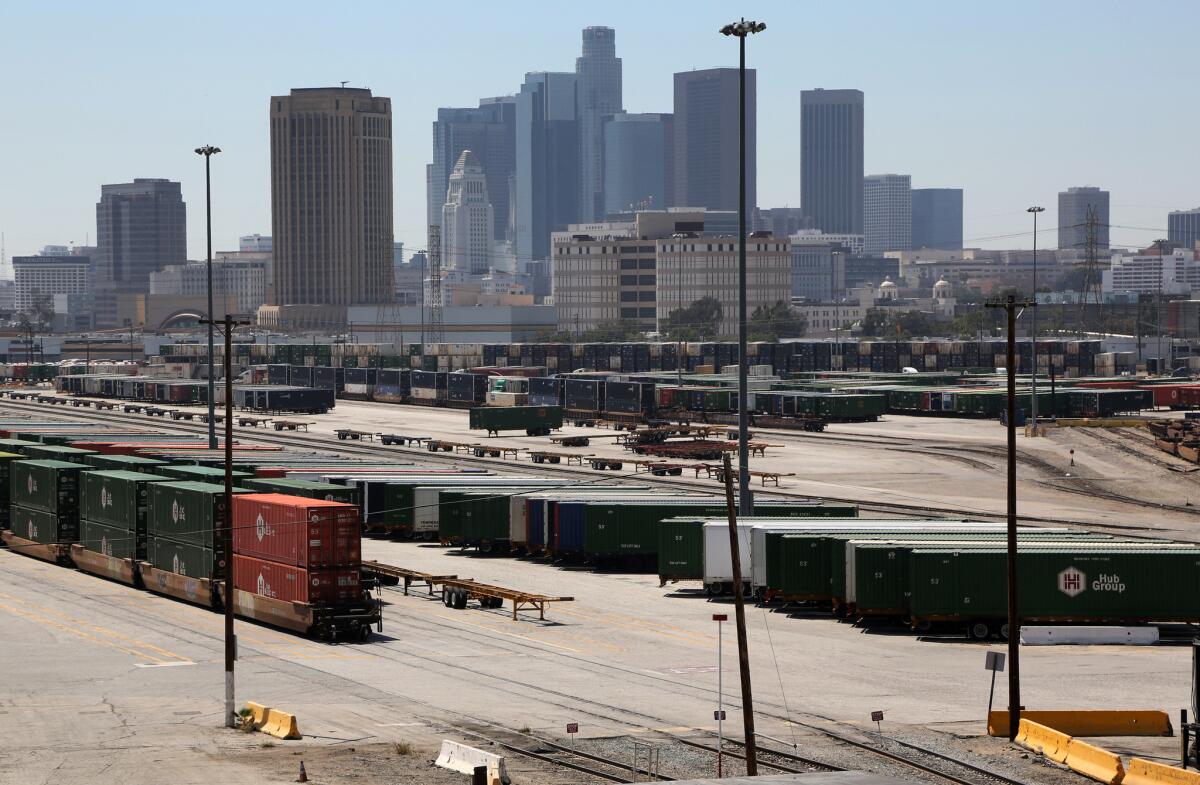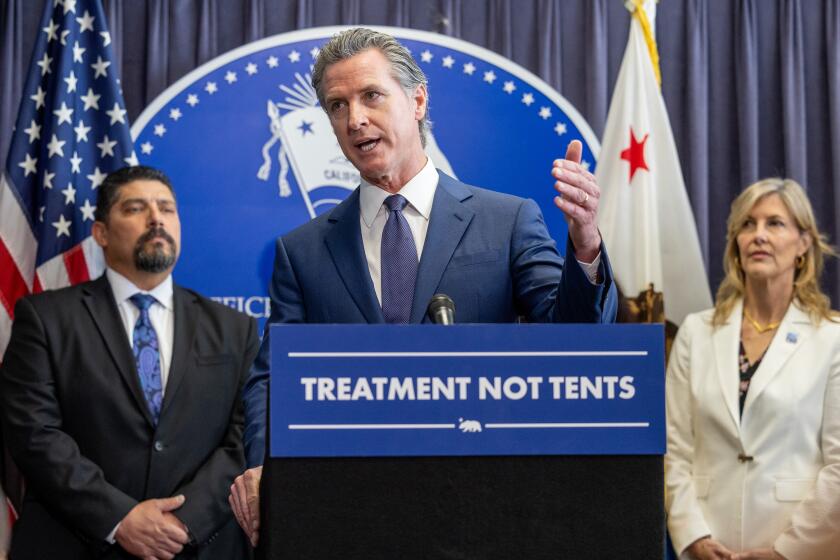If L.A. bids for 2024 Olympics, will taxpayers be on the hook?

The Union Pacific Intermodal rail yard could be repurposed as the centerpiece of the proposed $1 billion residential village for the 2024 Olympic Games bid.
When Los Angeles City Council members vote on pursuing the 2024 Summer Olympics this week, they will be deferring an issue that will probably return to haunt them: Whether city taxpayers should be made liable for budget overruns on the event, which is expected to cost at least $5.8 billion.
Boston’s bid for the Games collapsed in July after the city’s mayor balked at the fiscal guarantee, which the International Olympic Committee typically demands of host cities. In recent weeks, as preliminary plans and financial projections for L.A.’s bid have taken shape, city analysts have questioned the wisdom of consenting to cover excess costs.
On Tuesday, the council will vote on whether to authorize Mayor Eric Garcetti — who says he is willing to commit taxpayers to cover cost overruns — to move ahead with the bidding process by entering an agreement with the U.S. Olympic Committee.
A person familiar with the process, speaking on condition of anonymity, said that if the council gives its approval, the USOC could announce within hours that L.A. has been selected as the American bid city.
But the agreement before the council does nothing to resolve concerns about the city’s underwriting of potential Olympic deficits. And there are signs of burgeoning alarm at City Hall over the Games’ financial risks, suggesting that the question of taxpayer liability is far from settled.
City Controller Ron Galperin noted in a letter to council members last week that L.A. was still shaking off the effects of the recession that followed the 2007 financial crisis and he stated it would be “imprudent to ask city taxpayers to assume financial risks” associated with the Olympics.
“It is vital to properly and sufficiently safeguard Angelenos and our city government from possible losses — and to avoid placing our city in a position wherein we might have to indemnify the U.S. Olympic Committee or any other entity from losses they might incur,” Galperin wrote.
Westside Councilman Mike Bonin sounded a similarly cautious note, pointing out that the city refused to provide a financial backstop when it hosted the successful 1984 Summer Games.
“The City did not assume that responsibility in 1984. Why would it assume that responsibility now?” Bonin wrote in a letter to Council President Herb Wesson on Friday. “Since L.A. is the only U.S. city currently willing to bid on the 2024 games, have we used this strong negotiating position to ask the USOC to cover any costs or provide any financial guarantees?”
City-imposed cost controls on Olympic bids have a history in L.A., and not just from 1984. In 2007, council members — led by Garcetti, who was then council president — gave former Mayor Antonio Villaraigosa their blessing to pursue the 2016 Summer Games. But they included a big caveat: L.A. would under no circumstances be liable for Olympic deficits of more than $250 million.
Every Summer Olympics since 1960 has exceeded its budget projections. Some still made a profit. Others were brought to the brink of financial ruin. Montreal, where Mayor Jean Drapeau initially asserted that “the Olympics can no more lose money than a man can have a baby,” incurred $1.5 billion in debt from the 1976 Games that residents spent decades paying down through taxes.
Connie Llanos, a Garcetti spokeswoman, said the mayor “is confident that after a thorough vetting from the City Council and community members, everyone will agree that the potential for economic, civic and cultural gain will far outweigh any risks of agreeing to a financial guarantee.”
What the council as a whole will make of the IOC’s desired guarantee is unclear. Wesson, whose inclinations often serve as a bellwether for the rest of the council, has so far declined to take a position, saying he needs to further study the question.
L.A. bid leaders recently concluded weeks of negotiation with the USOC over the terms of a potential bid, the person close to the process said. Part of those talks involved revising the agreement to give the council greater influence over the bidding process and ensure that it has veto power over the final contract the mayor negotiates if the IOC selects L.A. to host the Games.
Zev Yaroslavsky, a former county supervisor who was on the City Council during the 1984 Games, said council members should use their new leeway to secure the sort of financial protections for the city that the mayor asserts are unnecessary.
“The council has won the right to be at the table,” Yaroslavsky said. “Now they have to play a role at the table, and do it seriously, with the protection of the taxpayers in mind.”
The question of a taxpayer guarantee against 2024 financial losses in L.A. has begun to take on greater urgency. Last week, Garcetti and Casey Wasserman — the sports executive and grandson of late studio mogul Lew Wasserman who has been the mayor’s chief private-sector partner in wooing the USOC — released their proposal and budget projections for hosting the 2024 Games.
Although the plan projects a $160-million budgetary surplus based on revenue from ticket sales, sponsorships and licensing agreements, it got a cool reception from city analysts. City Administrative Officer Miguel Santana and Chief Legislative Analyst Sharon Tso issued a joint report Thursday night warning that the plan lacked evidence for its cost estimates. As a result, they wrote, “it is difficult to determine the fiscal impact and risk to the City of hosting the 2024 Games.”
Andrew Zimbalist, an economics professor at Smith College who has studied the financial risks to Olympic host cities, said L.A.’s plan appeared to underestimate some key expenses such as building an Olympic Village for 17,000 athletes on property near the L.A. River that currently serves as a rail hub for Union Pacific Corp. The plan sets the price of buying and developing the property at $1 billion.
“This sounds to me like a project that’s $2 or $3 billion, not $1 billion,” Zimbalist said, noting the potential costs of relocating a major train facility and converting the land from an industrial to a residential site.
On the whole, Zimbalist said, “It’s an interesting plan. It’s got potential. But it does have these risks. And when you take those risks, you have to ask, ‘What’s in it for us at the end of the day?’”
Former City Councilman Bob Ronka, who was among those who argued against a financial guarantee for the 1984 Games, said Angelenos’ opinions on the prospect of hosting the Olympics swing widely depending on whether taxpayer dollars are at risk. Initial polling showed local support for the 1984 Olympics at more than 70%, he said.
Yet public sentiment essentially reversed itself when the question of a guarantee against cost overruns was introduced: In 1978, 74% of L.A. voters approved Proposition N, a ballot initiative that forbade city officials from putting public money on the line for the Games.
A telephone survey that L.A.’s bid committee commissioned in October showed 77% support for hosting the 2024 Olympics. The IOC’s insistence that a host city cover budget shortfalls was not mentioned in any of the survey questions.
Ronka acknowledged that L.A. is in a different position as it pursues the 2024 Summer Games than it was 30 years ago. The city was the sole remaining bidder for the 1984 Olympics, giving it greater leverage in negotiations with the IOC.
By contrast, other cities bidding for the 2024 event include Rome and Paris. The latter city, which has not hosted the Olympics since 1924, is seen as particularly tough competition.
Jeff Millman, a spokesman for the LA24 committee headed by Garcetti and Wasserman, said that L.A.’s bid would be “dead on arrival” without a city guarantee to cover cost overruns.
At the end of the day, Ronka said, the risk of losing the chance to host the Olympics must be balanced against the risk to L.A.’s finances.
“You have to make a hard choice,” Ronka said. “Is it worth having the Olympics on those terms?”
Follow @PeteJamison on Twitter for news from L.A. City Hall.
MORE ON THE OLYMPICS:
A surplus of $161 million is projected for L.A.’s 2024 Olympics bid
Opinion: Will L.A.’s Olympic ambitions hurt or help the river restoration?
L.A. City Council again pushes pause button on Olympic bid commitment
More to Read
Start your day right
Sign up for Essential California for news, features and recommendations from the L.A. Times and beyond in your inbox six days a week.
You may occasionally receive promotional content from the Los Angeles Times.








